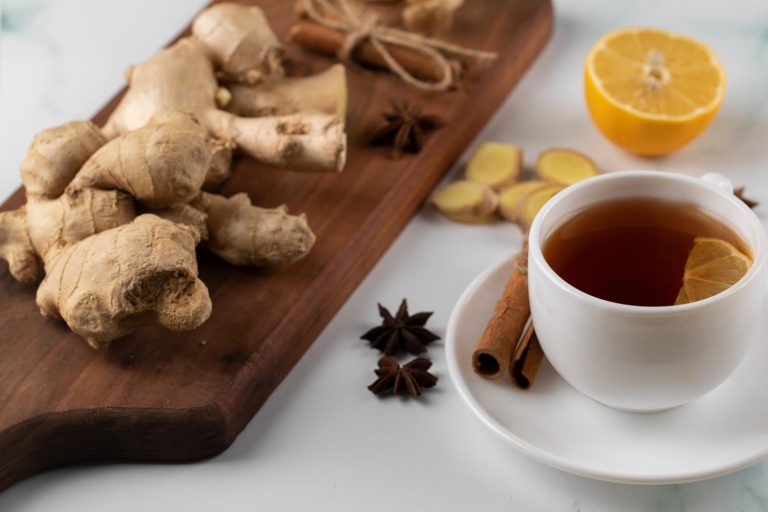Contents
5 Soothing Teas to Relieve Your Bloated Belly Fast
Have you ever felt that uncomfortable, tight sensation in your stomach after a big meal or maybe after indulging in a few too many treats? You’re not alone. Bloating is a common issue that can leave you feeling sluggish and uneasy. But what if I told you that a simple cup of tea could be your ticket to relief? Yep, you heard that right! Let’s dive into five soothing teas that can help relieve your bloated belly quickly.
1. Peppermint Tea
Why It Works
Peppermint tea is like a breath of fresh air for your digestive system. It contains menthol, which has been shown to relax the muscles of the gastrointestinal tract. This relaxation can help ease gas and bloating, allowing everything to move along more smoothly.
How to Use
Brew a cup of peppermint tea using either tea bags or fresh peppermint leaves. Drink it after meals to help with digestion.
Pros and Cons
- Pros: Quick relief from bloating, easy to prepare, and naturally caffeine-free.
- Cons: Some people may find peppermint too strong or experience heartburn if they consume it in excess.
Personal Take
I’ve noticed that sipping on peppermint tea after a rich dinner can work wonders. It’s like giving your stomach a gentle hug!
2. Ginger Tea
Why It Works
Ginger has been used for centuries as a natural remedy for various digestive issues. It helps stimulate the production of digestive enzymes, which can aid in breaking down food more efficiently. This can help reduce bloating and discomfort.
How to Use
You can make ginger tea by steeping fresh ginger slices in boiling water for about 10 minutes. Add a little honey or lemon for flavor if you like!
Pros and Cons
- Pros: Anti-inflammatory properties, can boost the immune system, and is versatile.
- Cons: Some may find it too spicy or irritating to the stomach in large amounts.
Personal Take
Whenever I feel that familiar bloat creeping in, I whip up a cup of ginger tea. It’s like my stomach’s personal cheerleader!
3. Chamomile Tea
Why It Works
Chamomile is not just a sleep aid; it’s also great for digestion. It can help relax the muscles of the intestines, which may relieve gas and bloating. Plus, its calming properties can help reduce stress-related digestive issues.
How to Use
Brew chamomile tea using dried flowers or tea bags. Drinking it before bed can also help promote a good night’s sleep.
Pros and Cons
- Pros: Calming effects, helps with insomnia, and is gentle on the stomach.
- Cons: Some people may be allergic to chamomile, especially if they have allergies to plants in the daisy family.
Personal Take
On particularly stressful days, a warm cup of chamomile tea feels like a mini-vacation for my mind and my tummy.
4. Fennel Tea
Why It Works
Fennel seeds have been used in traditional medicine for centuries due to their carminative properties, which means they help reduce gas and bloating. They stimulate digestion and can help relax the muscles in the gastrointestinal tract.
How to Use
You can make fennel tea by steeping crushed fennel seeds in hot water for about 10 minutes. Strain and enjoy!
Pros and Cons
- Pros: Natural remedy for gas, rich in antioxidants, and can help with menstrual discomfort.
- Cons: Fennel may not be suitable for everyone, especially those with specific allergies or hormonal conditions.
Personal Take
Fennel tea is a new favorite of mine; it has a unique flavor that’s refreshing and effective.
5. Green Tea
Why It Works
Green tea is packed with antioxidants and can help boost your metabolism. It also has anti-inflammatory properties that can soothe the digestive tract, making it a good option for bloating relief.
How to Use
Brew green tea using loose leaves or tea bags. Drinking it both hot and cold can be refreshing and beneficial.
Pros and Cons
- Pros: Loaded with antioxidants, can aid in weight management, and generally safe for most people.
- Cons: Contains caffeine, which might not be ideal for everyone, especially in the evening.
Personal Take
I love starting my day with a cup of green tea. It energizes me and helps keep my digestion on track!
FAQs
1. How quickly can I expect relief from bloating after drinking tea?
It varies by person, but many find relief within 30 minutes to an hour after drinking soothing teas like peppermint or ginger.
2. Can I drink these teas every day?
Most of these teas can be enjoyed daily, but moderation is key. If you experience any adverse reactions, it’s best to consult a healthcare provider.
3. Are there any side effects to these teas?
While generally safe, some individuals may experience allergic reactions or digestive issues. It’s important to listen to your body.
4. Can I combine these teas for better results?
Absolutely! Many people enjoy blending flavors, like ginger and chamomile, for a soothing effect.
Conclusion
Dealing with a bloated belly can be uncomfortable, but the right cup of tea can make all the difference. Peppermint, ginger, chamomile, fennel, and green tea each have unique benefits that can help soothe your digestive troubles. Personally, I’ve found that having a variety of these teas on hand means I’m equipped to tackle bloating whenever it strikes.
So, next time you feel that familiar tightness in your stomach, reach for one of these soothing teas and give your belly the love it deserves. Remember, though, that while these teas can be incredibly helpful, they’re not a substitute for medical advice. If bloating persists or worsens, it’s always best to consult a healthcare professional.
This article is for educational purposes only and is not a substitute for professional medical advice. Always consult a qualified healthcare provider before making changes to your health routine.
References
-
Ernst, E. (2006). Efficacy of ginger for nausea and vomiting: A systematic review of randomized clinical trials. American Journal of Obstetrics and Gynecology, 194(2), 590-596. https://doi.org/10.1016/j.ajog.2005.08.067
-
Mayo Clinic. (2022). Bloating: Symptoms and causes. Retrieved from https://www.mayoclinic.org/diseases-conditions/bloating/symptoms-causes/syc-20373866
-
National Institutes of Health. (2020). Ginger. Retrieved from https://nccih.nih.gov/health/ginger
Get Your FREE Natural Health Guide!
Subscribe now and receive our exclusive ebook packed with natural health tips, practical wellness advice, and easy lifestyle changes, delivered straight to your inbox.





